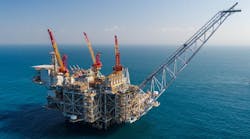By the OGJ Online Staff
HOUSTON, Oct. 1 -- Weather forecasts are calling for a colder than normal winter for most of the country, but analysts said even a cold winter will not be enough to reverse the current slide in gas prices.
The National Weather Service (NWS) said conditions this year are not right for El Nino, a phenomena in the oceans that tends to produce warmer than normal weather patterns. The NWS, which will roll out a detailed forecast Oct.18, said in a preliminary report it expects a lot of "variability" this winter.
WSI Corp., Billerica, Mass., also expects a colder winter, especially along the Pacific Coast and in eastern sections of the country. For October it projects cooler-than-normal temperatures in the eastern half of the US, along with California. Warmer-than-normal temperatures will be confined to the Plains and Rockies states, it said.
In November, WSI expects very cool temperatures again along the Pacific Coast, as well as the northern Rockies and Southwest. It does not expect any regions to have significantly warmer-than-normal temperatures.
In December, WSI expect most of the western half of the country to continue to be cooler-than-normal, especially the Pacific Coast states and the Southwest. Near or slightly below normal temperatures are expected in the eastern half of the country. The Midwestern states will experience slightly above normal temperatures.
Last winter the Energy Information Administration forecast that if the weather were 10% colder than normal, gas consumption could increase by an additional 3.6 bcfd or 5%. But analysts said prices will stay below $3/Mcf this winter, despite forecasts of colder weather, and far below the $10/Mcf prices that shocked consumers last winter.
EIA is due to release its winter fuels forecast Thursday.
Gas storage overhang
"A cold winter will help us out, but not enough to counteract all that gas in storage," said Jim Rollyson, analyst with Raymond James & Associates. By the start of the 2001-02 heating season, working gas in underground storage is projected to be 14% above last year's level and 5% above the previous 5-year average, the EIA said.
Futures contracts on the New York Mercantile Exchange for January delivery are trading between $2.75-2.80/Mcf. December gas contracts are trading even lower at about $2.50/Mcf. Rollyson expects gas prices to continue to fall in November despite the prediction of a colder winter.
Prices could approach $1.50/Mcf in November, he said. Natural gas production will peak late in the third quarter. The increased output of gas coupled with the slumping economy means there are not enough buyers to "suck it up," he said.
However, WSI said forecasts of a cold autumn could have repercussions in the electricity market. Electricity prices could shoot up, if demand for power increases during an early colder winter, while many power plants are still off line for scheduled maintenance, WSI said.
According to the Nuclear Regulatory Commission, 18 nuclear power plants are in some phase of refueling outage already. Nuclear plants are large base load plants that are counted on to meet heavy demand in summer and winter. Nuclear plants are usually refueled in the spring or fall during so-called shoulder months between the high demand seasons.
